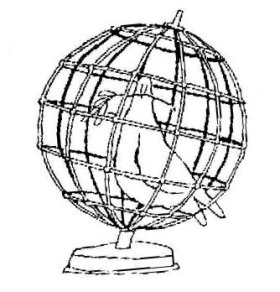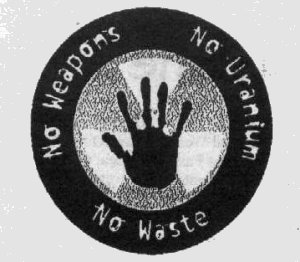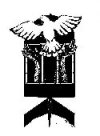It's been a busy fall and winter for anti-nuclear forces worldwide. A sampling of other reported arrests in several countries:
Confronted at home by the Trident Ploughshares 2000 disarmament
campaign, the British nuclear submarine fleet is facing additional
challenges from abroad and within. Last May the HMS Tireless was forced to
dock at Gibraltar by a leaky reactor cooling system. Subsequent
investigation has revealed a systemic problem in all the hunter-killer
submarines, which provide necessary support for Britain's four Trident
nuclear missile submarines.

Four Gibralterians were arrested November 20 while holding up anti-nuclear placards in their Parliament's gallery. On January 16, ten Greenpeace activists from four European countries were arrested after circling the sub in protest boats. The sub's crew nabbed two people who hung a protest banner off the side of the ship.
On October 25, an empty nuclear waste cask arrived in Australia. Four Greenpeacers boarded the ship and locked the cask down to prevent it being loaded with waste nuclear fuel for reprocessing in France. Sydney Harbor police arrested and forcibly removed the three men and one woman, but no charges were filed. When the ship departed in January, seven Greenpeace activists were arrested in Botany Bay as they sought to interfere.
Around Cherbourg, France, at least 17 arrests were reported between January 14-19 on a rail line and at the port where reprocessed nuclear fuel was being loaded for shipment back to Japan.
About 50 people locked themselves together to block a December waste shipment from Dodewaard, Holland. Police cut the chains and arrested eleven. At Vlissingen port, Greenpeace activists boarded the British transport ship to prevent it from docking.
In Finland, the head offices of a forestry corporation were targeted for protest over the company's role in a proposed new nuclear power plant. Thirteen people occupied the building and hung a large protest banner on the building wall, but no arrests were reported.
Dutch police arrested almost 100 people near the train station in
The Hague, where they had gathered on November 22 during the international
conference on global climate change. They planned to march on several
embassies, demanding that nuclear energy not be endorsed as part of the
solution to global climate change. Another group of demonstrators disrupted
a key committee meeting at the conference with a sit-in.

Just before NATO foreign ministers gathered in Brussels for their mid-December meeting, Greenpeace supporters linked hands to block the main entrance to the Alliance's headquarters. A huge helium balloon emblazoned with "Stop Star Wars" floated above them. Police arrested 39 people as the protest was broken up, but released all without charge after about seven hours, when the NATO meetings were done for the day.
Continuing a campaign against Russian reprocessing of foreign reactor fuel at Chelyabinsk, four villagers from the Ural Mountains region who are suffering from the effects of radiation pollution delivered contaminated soil to the Russian Parliament on October 10. As they poured the soil contaminated from Cold War decades of reckless nuclear activity in the area, into barrels on the steps of the building, ten Greenpeace activists unfurled a banner declaring "Russia doesn't want foreign nuclear waste."
